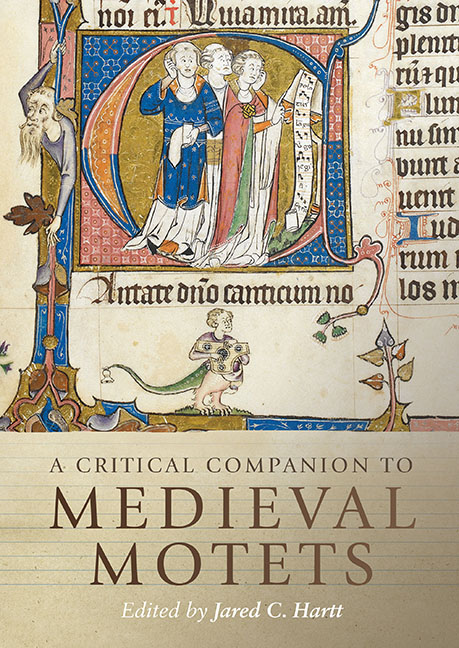Book contents
- Frontmatter
- Dedication
- Contents
- List of Figures
- List of Music Examples
- List of Tables
- List of Contributors
- Preface
- Acknowledgments
- Abbreviations
- Introduction: Approaching Medieval Motets
- 1 The Genre(s) of Medieval Motets
- 2 Origins and Interactions: Clausula, Motet, Conductus
- 3 Tracing the Tenor in Medieval Motets
- 4 Isorhythm
- 5 Notation
- 6 Thirteenth-Century Motet Functions: Views through the Lens of the Portare Motet Family
- 7 A Prism of its Time: Social Functions of the Motet in Fourteenth-Century France
- 8 Motets, Manuscript Culture, Mise-en-page
- 9 Clerics, Courtiers, and the Vernacular Two-Voice Motet: The Case of Fines amouretes / Fiat and the Roman de la poire
- 10 When Words Converge and Meanings Diverge: Counterexamples to Polytextuality in the Thirteenth-Century Mote
- 11 Motets in Chansonniers and the Other Culture of the French Thirteenth-Century Motet
- 12 Building a Motet around Quoted Material: Textual and Musical Structure in Motets Based on Monophonic Songs
- 13 The Duet Motet in England: Genre, Tonal Coherence, Reconstruction
- 14 Materia Matters: Reconstructing Colla/Bona
- 15 Machaut’s Motet 10 and its Interconnections
- 16 A Motet Conceived in Troubled Times: Machaut’s Motet 22
- 17 A Motet Ahead of its Time? The Curious Case of Portio nature/Ida capillorum
- Bibliography of Works Cited
- Select Glossary
- Index of Cited Motets
- General Index
- Studies in Medieval and Renaissance Music
11 - Motets in Chansonniers and the Other Culture of the French Thirteenth-Century Motet
Published online by Cambridge University Press: 21 October 2020
- Frontmatter
- Dedication
- Contents
- List of Figures
- List of Music Examples
- List of Tables
- List of Contributors
- Preface
- Acknowledgments
- Abbreviations
- Introduction: Approaching Medieval Motets
- 1 The Genre(s) of Medieval Motets
- 2 Origins and Interactions: Clausula, Motet, Conductus
- 3 Tracing the Tenor in Medieval Motets
- 4 Isorhythm
- 5 Notation
- 6 Thirteenth-Century Motet Functions: Views through the Lens of the Portare Motet Family
- 7 A Prism of its Time: Social Functions of the Motet in Fourteenth-Century France
- 8 Motets, Manuscript Culture, Mise-en-page
- 9 Clerics, Courtiers, and the Vernacular Two-Voice Motet: The Case of Fines amouretes / Fiat and the Roman de la poire
- 10 When Words Converge and Meanings Diverge: Counterexamples to Polytextuality in the Thirteenth-Century Mote
- 11 Motets in Chansonniers and the Other Culture of the French Thirteenth-Century Motet
- 12 Building a Motet around Quoted Material: Textual and Musical Structure in Motets Based on Monophonic Songs
- 13 The Duet Motet in England: Genre, Tonal Coherence, Reconstruction
- 14 Materia Matters: Reconstructing Colla/Bona
- 15 Machaut’s Motet 10 and its Interconnections
- 16 A Motet Conceived in Troubled Times: Machaut’s Motet 22
- 17 A Motet Ahead of its Time? The Curious Case of Portio nature/Ida capillorum
- Bibliography of Works Cited
- Select Glossary
- Index of Cited Motets
- General Index
- Studies in Medieval and Renaissance Music
Summary
I N THIRTEENTH-CENTURY MOTET SCHOLARSHIP, the question pertaining to the existence of repertories and practices both from borderland provenance and culture remains an intricate issue. It has been overshadowed by the evidently dominant role of Paris in both the creation and transmission of a repertory largely preserved and told in manuscripts from the Île-de-France. It has been further obscured by the dearth of documentation on the circulation and reciprocal influences among the existing sources. Several studies have nevertheless examined sources and documentation testifying to the existence of non-Parisian motet practices or repertories, but either the sources and documentation are later than the thirteenth century, or they witness practices and works stemming from Parisian central culture, thus testifying to the influence of the latter rather than the emergence of indigenous local corpora.
In this search of motet repertories possibly created and preserved outside of the Parisian bosom, an ensemble of promising sources has until recently received only little consideration: the thirteenth-century chansonniers. The songbooks preserve a significant repertory of 294 occurrences of motets disseminated in seventeen sources, offering a total of 209 different works. This ensemble divides into two categories. The first contains motets that are recorded in a separate, distinct collection, in some cases identified as such by a preliminary rubric. Six sources (listed first in Table 11.1) include such collections, accounting for 225 occurrences; some of them are among the largest repositories of thirteenth-century motets. The second category includes motets copied within the song collections themselves, without any particular distinction regarding their genre. These 59 occurrences of motets, which ‘wander’ amid songs, occur in all seventeen sources listed in Table 11.1. Finally, 10 further motets constitute a special case that escapes either category. Copied as additional items in the empty staves of Roi at both ends of the codex, they consequently do not appear as isolated motets disseminated within a trouvère song set. Nor do they constitute a separate consistent motet collection, as they are copied by different scribal hands alongside a variety of musical works, and were entered at different stages between the end of the thirteenth and the mid fourteenth century.
- Type
- Chapter
- Information
- A Critical Companion to Medieval Motets , pp. 225 - 242Publisher: Boydell & BrewerPrint publication year: 2018



